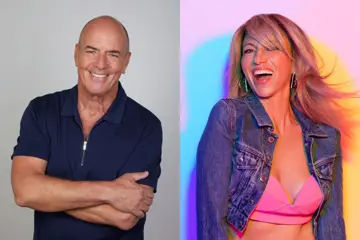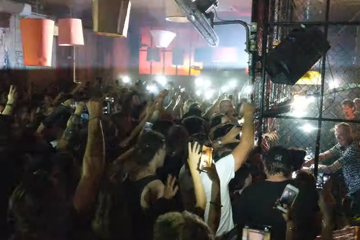Have you hopped on Instagram lately? I have. In a rudimentary scroll on my morning commute I found myself contemplating purchasing teeth whitening devices, tea that will make me thinner, purple reflective sunglasses and a cute yoga mat, all while experiencing a strange urge to eat a vegan Buddha bowl and jump into the ocean naked. Then I realised I was being had.
My newsfeed is flooded with product placement. It's like a show reel of pretty advertising disguised as filtered flatlays, colour-corrected lunches, road trips to deserted beaches, fashion shows, vintage surf shops and skinny models drinking tea. But on the surface it just looks like these beautiful women are sharing photos of their day-to-day activities (do they even work?). Instagram has become what is known as native content advertising - basically, high-follow 'grammers are selling you an 'idea' and a 'lifestyle' that makes you voluntarily click on the tagged swimwear brand and find the togs they're wearing. You don't actually realise that you're looking at an ad. And that flippant post is #youreWORTHit #loveyouALOT of #dontneednoMONEY.
Social media stars are not just promoting silver wave rings; they're marketing an idea of beauty that isn't raising red flags the way magazines and billboards do.
But it's not cash exchange that's an issue here. It's a specific technique used by many advertisers on many platforms - the selling of ideas. If you buy a Jeep, you'll constantly be away on road trips rock-crawling in the mountains. If you buy a particular perfume, you'll have a great hunk of man in an open shirt appear in your bedroom. If you buy Nescafe, George Clooney will make it for you. We're used to seeing these commercials; they're unrealistic and entertaining. But on Instagram selling a lifestyle is a little more insidious. Social media stars are not just promoting silver wave rings; they're marketing an idea of beauty that isn't raising red flags the way magazines and billboards do. The latter are openly photoshopped — we've had that argument. These are 'real women' living 'everyday lives' as artists, designers, mums, high school students. They take these photos on their iPhones and edit them with apps that are readily available for us all to download. Many are raw shots using vintage cameras wielded by friends/professional photographers, cough. If they can live like that, you can too. That's the message we're being sold, and it's dangerous.
The trend of #fitspo and #cleaneating is contributing to newfangled things like orthorexia — an obsessive fixation on healthy eating, equally as debilitating as anorexia (by the way, we've almost hit the one million mark on eating disorder cases in Australia, according to the Butterfly Foundation). Fitspo 'grammers are an interesting sub-genre of the social media starscape. They, more than most, sell us a healthy, attainable lifestyle compete with lots of green juices, activewear fashun and morning workouts. In a country riddled with obesity, where's the harm in a little health promotion? These 'grammers vehemently reject the notion of misleading followers with advertising and doing anything other than 'helping' and 'inspiring', really. But if your job is to have a six-pack and take photos of said abs with, oh look, sorry, you're holding kale… then yes, you're misleading us. You're making us believe that we can look like you. Screw genetics and stress-eating over a deadline, you too can have a perfect tan and Barbie's legs if you follow the guide in my e-book!
Social media stars are not experts in fitness and nutrition. They're experts in angles, hues and inspirational captions about accepting yourself.
Don't miss a beat with our FREE daily newsletter
I'm going to say this only once: social media stars are not experts in fitness and nutrition. They're experts in angles, hues and inspirational captions about accepting yourself (in the meantime, you're curling into a ball of insecurity while scrolling through candid holiday snaps of their perfectly-toned-everything on a yoga trip to Bali). Unless they have a degree in nutrition and a certification in personal training and they're consulting you in person, their programs have the potential to be harmful; they don't take into account your past injuries, your nutritional deficiencies, your lifestyle. Like every bit of health advice you glean from the media, sure, take it all as a guideline. But don't follow it as the golden rule that you need to stick to day in, day out, until you've developed orthorexia, anorexia, poor self-esteem, body dysmorphia, shin splints or a horrendous nutritional deficiency. The wellness veneer doesn't make social media harmless, it simply disguises itself for what it really is — an idea of health, vitality, beauty and success that isn't attainable for the average person, promoted by 'the average person'. And Instagram's latest tailoring algorithm that decides what posts are prioritised on your news feed based on their assumptions about your preferences means that we have even less control over what we view and what messages we're subliminally ingesting.
If I spent my time doing sit-ups, HITT work outs, meditating, eating lovely vegan food with friends, doing more sit ups and getting away on surf trips as a job that earned me thousands a week, then yeah, I'd probably look like that too. Heck, I've found myself wondering if I could pump up my narcissism enough to do it! But then I realised something; I don't want to be the reason a 17-year-old is failing her HSC because she's up at 5am every day sprinting and reducing her calories so she can have legs like mine. I don't want to get paid lots of money to sell tiny bikinis to women who later beat themselves up because their arse didn't look the way mine did in the photo. I don't want to ruin my friendships by making them take hundreds of photos of me on our headland walk, or make my hot boyfriend pose for topless photos to increase my followers. I want to, you know, have a life. A real one.















